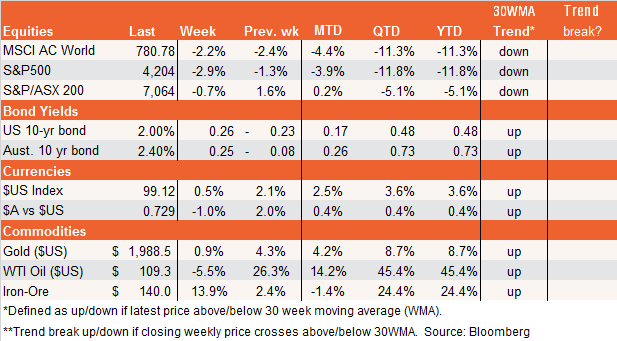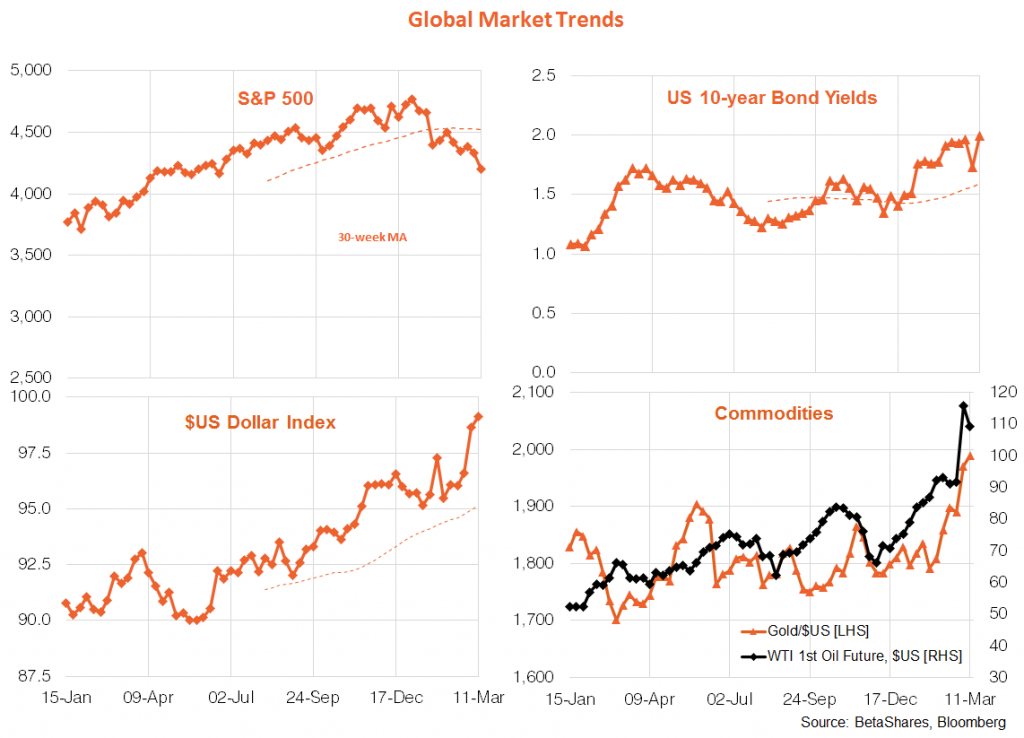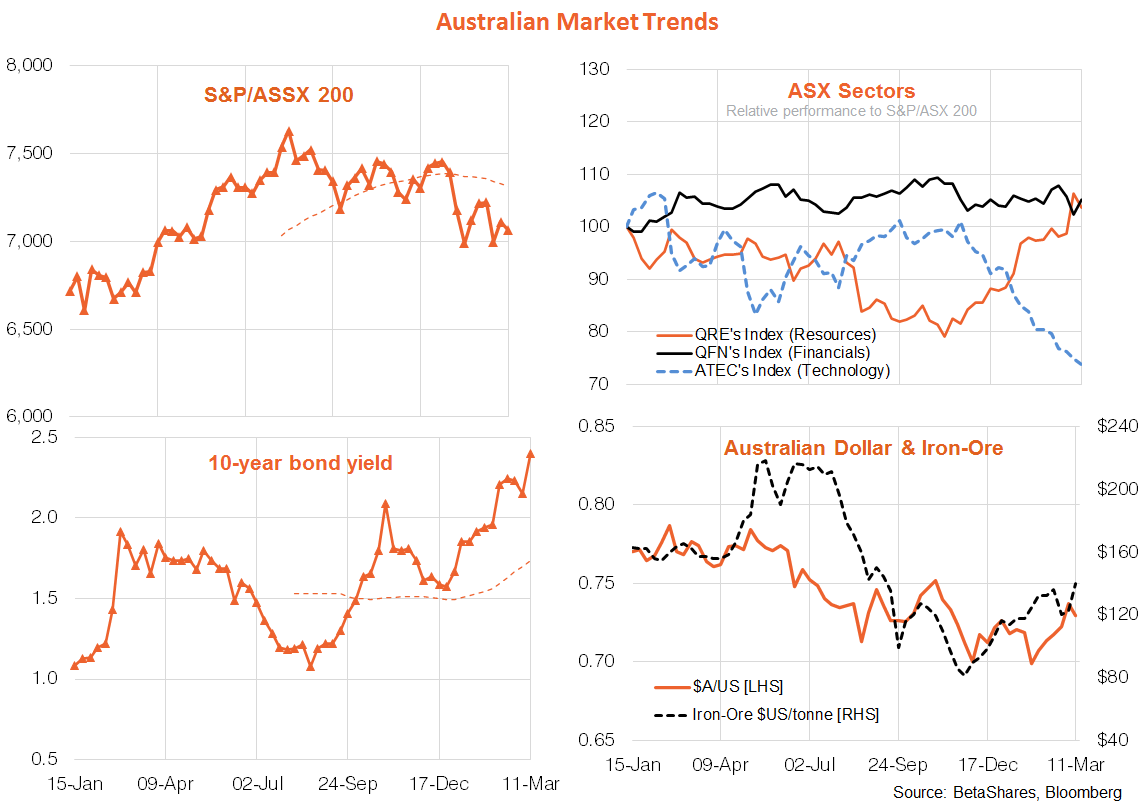Betashares Bites: Oil spikes, Putin’s dilemma, Fed fears build
It was another poor week for global equities, with the U.S. S&P 500 down 2.9% and on the cusp of breaking to a new low in the correction to date. Confirmation that the U.S. and U.K. would ban Russian oil imports got the week off to a wobbly start, while confirmation of persistent, very high U.S. consumer price inflation later in the week did not help. And just for added displeasure, Putin upped the ante over the weekend by threatening to attack NATO provided military supply lines into Ukraine – and then promptly bombed a military base close to the Polish border.
Although oil prices dipped a little over the week (as the U.S. ban on oil was already anticipated), U.S. 10-year bond yields surge back to almost 2%. Growth/technology exposures continued to take the greatest market beating.
.png)
Regarding Ukraine, as unsavoury as it sounds, perhaps the best near-term market hope is a peace deal in which the embattled nation promises neutrality and perhaps even cedes a little territory. With its economy crumbling, regime change in Russia is another hope (with Putin potentially jailed and charged with war crimes) though it remains to be seen if anyone in Moscow has the ticker to attempt it. Otherwise, it seems clear Putin won’t back down and will bomb away until he can install at least a temporary puppet government to agree to terms – after which he might manage a face saving withdrawal lest he face a resource sapping guerilla war by 40 million Ukrainians.
If it’s the latter scenario, this horrible war could drag on for weeks – which will keep oil prices high and likely leader to greater concern of global financial contagion from the implosion in Russia’s economy.

It gets worse. I have not yet even mentioned the Fed – which is set to raise interest rates by 0.25% this week, and likely increases the number of times it expects the raise rates this year and next. Back in December, the Fed forecast three rate rate rises this year, taking Fed funds from a range of 0-0.25% to 0.75-1.0% – and three more rate rises in 2023, taking the range to 1.5%-1.75%. Of course, the market already has six to seven rate hikes priced for this year – though it’s likely the Fed will only increase the number of expected hikes for this year to four or five at this week’s meeting. Given new uncertainties related to the Ukraine war it’s unlikely the Fed will pencil in as many hikes for this year as the market already has – but if it does bonds markets would likely sell off even further.
As it stands, I maintain my call of a U.S. 10-year bond yield of 2.25% in H1’22, with a growing risk it could hit 2.5% in H’22. The good news is that U.S. equity valuations have already fallen somewhat in the correction to date, though with the U.S. S&P 500 trading on a forward PE ratio of of 19.1 – it’s hardly cheap – and still above my H1’22 target of 18.
Of growing concern to me, moreover, is that the still upbeat U.S. earnings outlook could be the next shoe to drop – especially given the squeeze on real incomes from higher inflation and multiple Fed rate hikes ahead. The key issue is whether a soft landing for the U.S. economy will be sufficient to contain inflation and inflation expectations – given a post-COVID recovery, already tight labour market and surging oil prices – or whether Volcker 2.0 will be required. Bond markets are pricing in a Volcker type response yet equity markets expect this to only result in a soft landing and ongoing growth in corporate earnings. I hope the equity market is right but my confidence is wavering.
Australian Market
The big local news last week was RBA Governor Lowe’s concession that a rate rise this year was at least “plausible”. This shift in rhetoric plus the recent war-related surge in oil prices has caused me to fall on my sword and now pencil in two local rate rises this year, in September and November. This would allow time for the RBA to review at least two more quarterly wage price index reports. To my mind, it will now be sufficient for annual wage growth to merely increase further – from 2.3% to 2.75% by September to justify a hike, given increasing global central bank concern with the impact of sustained high consumer price inflation on inflation expectations.
Although the local market has displayed an outperforming bias versus global markets in recent weeks (thanks to our energy/resources over technology sector exposures), the overall market is still struggling as part of the broader global equity correction.
Minutes to the recent RBA meeting could shed further light on the Bank’s definition of “plausible” when released on Tuesday – the day on which we also get an important update on Chinese retail sales and industrial production. Of some concern is yet another COVID variant emerging, with China still hell bent on shutting down it’s economy where needed to eliminate any outbreak. Note also while the $A and commodities are currently feeling upbeat, if the Fed does get aggressive the commodity complex won’t be immune to a downturn.

Follow for more Bassanese Bites
Each week I publish my latest thoughts on the macro events shaping the ETF landscape. To be the first to read my insights, hit the follow button below.
Trusted by hundreds of thousands of Australian investors, BetaShares offers cost-effective, simple and liquid access to the broadest range of ETF investment solutions available on the ASX, covering almost every asset class and investment strategy.
2 topics

